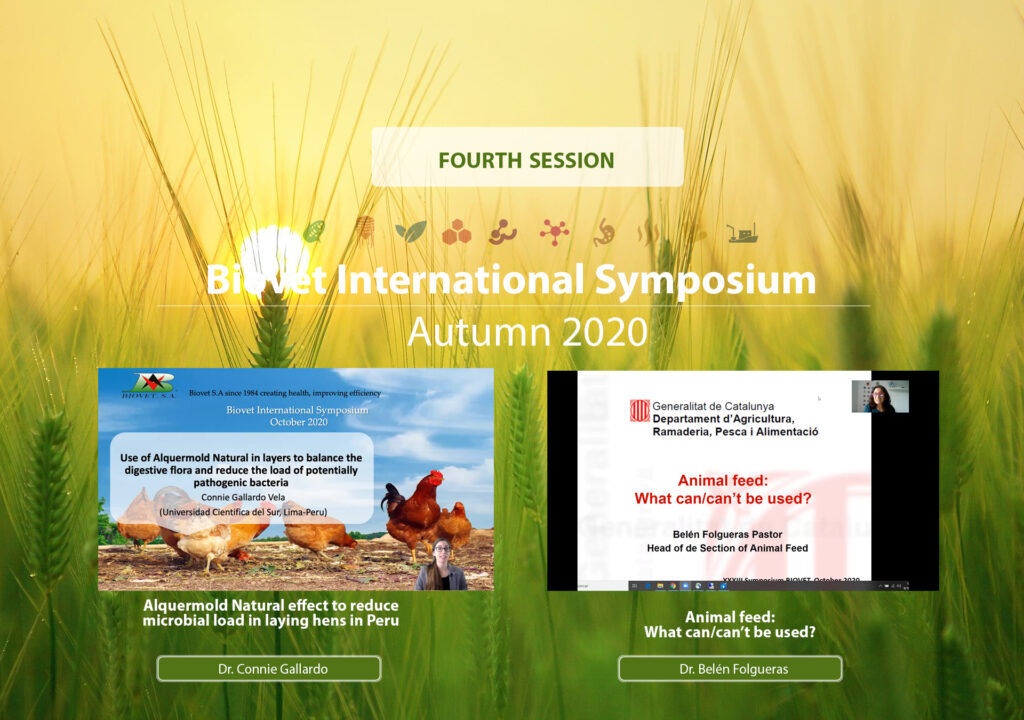Alquermold Natural to reduce microbial load in commercial laying hens
The trial, carried out in the Universidad Científica del Sur, was presented in the fourth session of the Biovet International Symposium
Challenges in commercial laying hens was the title of the fourth session of the Biovet International Symposium held on Thursday October 15th 2020. In this videoconference a trial about the use of the natural preservative of Biovet S.A., Alquermold Natural, to reduce microbial load in laying hens in Peru was presented.
In commercial layers, it is crucial to control the microbial load of laying hens to ensure that the egg is of an optimal quality and safe for human consumption. In addition, laying hens have a very high productive pressure which can lead to imbalances and, therefore, produce problems in egg quality or reduce laying rate.
The use of natural products to reduce the presence of microorganisms is essential to prevent digestive disorders that negatively affect the production parameters. Alquermold Natural is a natural preservative with bactericidal and fungicidal activity. It acts as an intestinal biocide when adding the product in drinking water or in the feed. It promotes the balance of digestive flora and avoids the growing of Salmonella, E. coli, Clostridium and Campylobacter, among others.
Trial about Alquermold Natural in laying hens in the UCSUR
The use of Alquermold Natural has been recently tested in the experimental farm of the Universidad Científica del Sur (UCSUR) and was presented in the Biovet International Symposium by Dr. Connie Gallardo, professor at the same university.
224 pullets Dekalb Brown of 15 weeks of age were used for the trial. The study began in the last weeks of rearing and up to week 29 of age, with a total duration of 15 weeks.
Four batches were used: a control batch with a base diet without preservatives or products to control the digestive flora; a batch with Alquermold Natural at 0.5 kg/t; a batch with a commercial product based on organic acids; and a product with 33% formaldehyde.
Results showed that the batch with Alquermold Natural improved performance in rearing and production thanks to a good balance of the digestive flora. The batch with Alquermold Natural also obtained a lower percentage of dirty eggs. This is closely related to the contamination of eggs by microorganisms which can be a problem for food safety. In the microbiological results, a reduction of E. coli, Campylobacter and Clostridium was observed in egg, intestine and feces. The control and reduction of these microorganisms prevent contamination of the eggs, which has a positive impact on public health.
In conclusion, the trial demonstrates that Alquermold Natural is an effective alternative to formaldehyde and organic acids. It obtained an improvement of the production parameters and egg quality, in addition to a reduction in the microbial load. That is translated into safer eggs, less danger of zoonoses and better food safety.
European regulations on raw materials and feed
This fourth session ended with a conference by Belén Folgueras, head of the Animal Feed section of the Generalitat de Catalunya. The conference was about the regulatory framework that exists in Catalonia and the European Union on issues related to additives, raw materials and feed used in animal nutrition.
This was the last session of the Biovet International Symposium where about 140 attendees participated. The training was closed by Lic. Carlos Domenech, manager of Biovet S.A. Mr. Domenech highlighted the delicate situation that most countries are going through because of the global pandemic. However, he emphasized the research work that Biovet S.A. continues to do to develop products that positively affect both farm performance and human nutrition.

